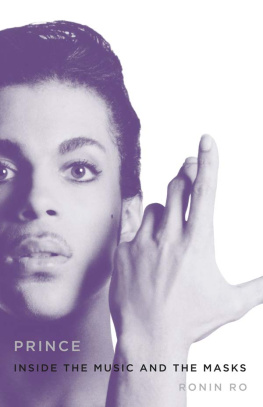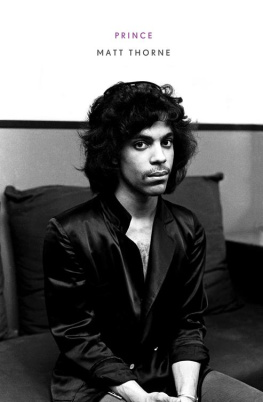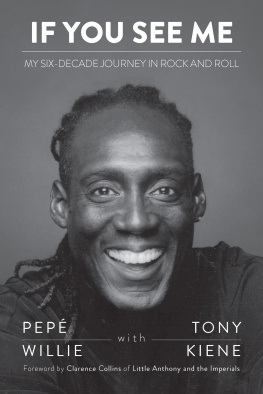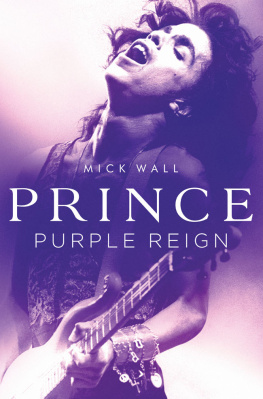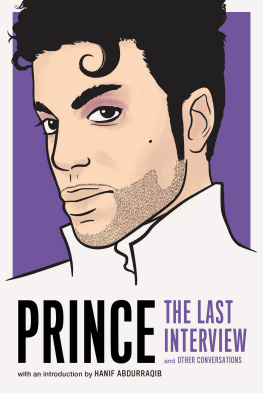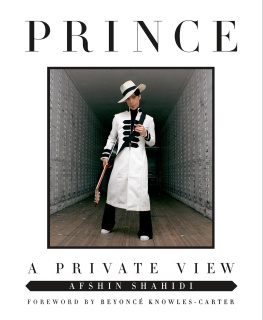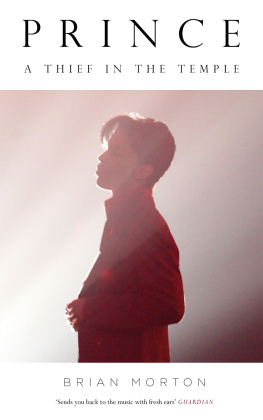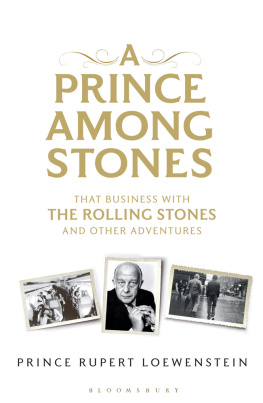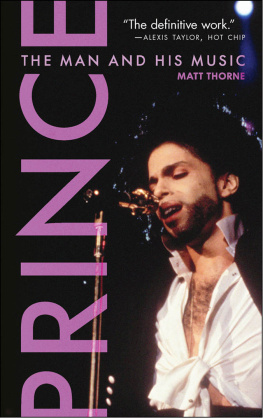Prince
ALSO BY RONIN RO
Gangsta
Have Gun Will Travel
Bad Boy
Street Sweeper
Tales to Astonish
Raising Hell
Dr. Dre


In this life? Youre on your own.
PRINCE , LET S GO CRAZY
THIS THING CALLED LIFE
ON JUNE 7, 1958, AT MOUNT SINAI HOSPITAL IN MINNEAPOLIS, A baby was born. John Nelson faced his son in the crib and named him Prince Rogers Nelsonafter his own musical stage name. I named my son Prince because I wanted him to do everything I wanted to do, John later explained to Liz Jones.
They lived at 915 Logan Avenue, a humble home in North Minneapolis. John worked at Honeywell, an industrial supplier, and he and his wife Mattiea former singer that John met while playing parties with his group, The Prince Rogers Triotogether cared for their first son. They were already trying to raise five kids on what John earned at Honeywell when Prince was born, but within a year Mattie was again pregnant. When their daughter, Tyka Evene, arrived in 1960, John saw his dream of a music career slip even further away.
Mattie also gave up her dreamsince singing like Billie Holiday wouldnt pay the bills. She remained social, though, with a wild side, Prince told Rolling Stone, while John was quiet, excited mostly by music.
Since John still played shows around town with The Prince Rogers Trio, and still sometimes answered to his stage name, Mattie took to calling their son Skipper. Prince obviously knew about his fathers history leading his own big band, playing around the Midwest and stuff, and how his mother sang for the group. But he didnt truly understand what his father did until 1963. One day, his mother took him to a local theater. They took their seats, the lights dimmed, and John emerged from behind a curtain with a smile. People applauded as he sat at a piano. While he played, the curtain moved again, and scantily clad dancing girls came out. People were screaming, Prince recalled, according to Per Nilsen. From then on I think I wanted to be a musician.
The show took a hold of Prince, and for weeks after he tried to play any instrument within reach. He eventually settled, like his father, on the piano, and he would practice in the living room on Johns. Then, in department stores, while Mattie shopped, Prince would rush to where the radios and instruments were kept to listen to music or play organs and pianos until his mother would get him. But piano wasnt enough. Prince would put two rocks in his hands, then smash them together to create a melody. He called this noise his first song. Soon, hed use larger rocks to tap out a rhythm.
But while Prince was taking his first musical steps, John was finding the pursuit a rough life. He was, according to local reporter Neal Karlen, a Jazz musician in the whitest metropolitan area in the country. With a wife and six kids to support, he continued to work at Honeywell, but he couldnt accept that he wouldnt someday be a music star. So he kept creating new melodies. Despite a limited income, John did things like install a TV in the living room wall. Or hed parade around in new suits and shoes, as if about to take the stage. By 1966, John had bought himself a snazzy new white Thunderbird convertible. His dream seemed by turns impossible and just within reach. When he saw that Prince and his younger sister Tyka were interested in music, he encouraged them to play his piano, realizing hed have to live his dream vicariously through them. While young Prince tapped out melodies, Tyka told City Pages, she sang, because thats what my mom and dad did.
But just as quickly, moody John would see them bang away on the keys and tell them to get away from the piano. He needed it for his own dream, after all. Though the inner conflict persisted, inevitably he relented, and Prince showed him a melody he had written called Funk Machine.
Monday through Friday, Prince attended elementary school, where other students sometimes insulted his diminutive size. By 1967, the fifth grader was being bussed to a school in an affluent, predominantly white suburb. He wasnt thrilled. One day in class, he turned to a page in a textbook that had a black-and-white photo of a young, dead black man hanging from a rope on a tree.
His sister Tyka recalled, according to Per Nilsen, that other students chased them back to the school bus many afternoons. I didnt know it was because we were black, she said. Some days, other students by the bus protected them. But the next day would always bring another chase and more epithets. Inevitably, Prince tried to withdraw from the experience.
One morning he hid his socks, believing this would give his mother no choice but to let him stay home. No dice. She yelled, Youre going to get to that school and find some socks! He sighed and kept dressing. She couldnt have them calling me a nigger with no socks on, he told PAPER Magazine, in 1999.
Sundays, his mother took him to a wooden, two-story Seventh-day Adventist church where he was enrolled in a Bible study class. On these days, eight-year-old Prince bonded over music with his schoolmate, Andr Simon Anderson, the son of his dads former bass player, Fred. The most I got out of that was the experience of the choir, Prince said of church, according to Nilsen.
During this period, Princes older half brother, AlfredMatties son from her first marriagewas trying to dodge a few rules. In his room, Alfred sang along to his many James Brown records. He styled his hair in a Little Richardtype conk. He always seemed to have money. He also ignored John Nelsons curfews. Late at night, Alfred climbed out of a basement window and hit the street. With him gone, Prince and his cousin Charles tiptoed into his room to try on his clothes and play his James Brown records. Sometimes, Alfred caught them in the act. But he didnt mind.
In the end, things didnt end well for Alfred, Charles told author Per Nilsen years later. His recreational drug use led to confinement in a local mental institution.
Prince, himself, was born epileptic. As a child, he had seizures. While he trembled and shook, his parents stood nearby, wondering how to help. Still, they did the best they could with what little they had, he explained.
There were other stressors. In 1981, Prince told New York Newsday that his father felt hurt that he never got his break, because of having the wife and kids and stuff. With Mattie resenting this, there were constant fights.
By 1968, Prince was watching things finally fall apart between his parents. They began having high-volume arguments that sometimes left Mattie in tears. Mattie and John had always been different. She was louder and more vivacious, while John was serious and strict. She had set aside music in the interest of her kids, while John did manage to play some shows in local clubs. I think music is what broke her and my father up, Prince later told New YorkRocker. Serious musicians, like his father, could be moody. They needed space. Everything in their environment had to be just right. My father was a great deal like that, and my mother didnt give him a lotta space. She wanted a husband per se.
Finally, John and Mattie called it quits. After thirteen years of marriage, they decided to separate and filed for divorce. John packed his stuff and moved into a small apartment near Minneapoliss downtown. Prince was shocked when John left. He didnt even take his piano. Everything was cool I think, until my father left, and then it got kinda hairy, Prince said.

